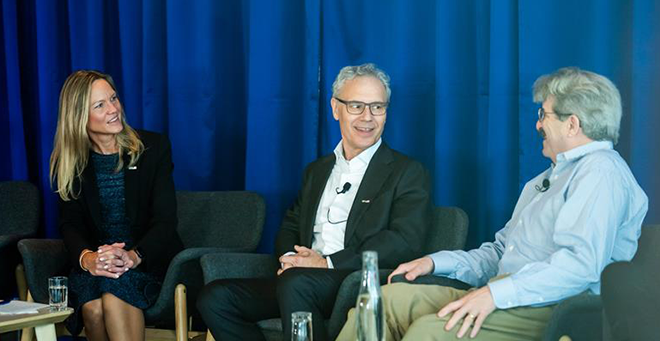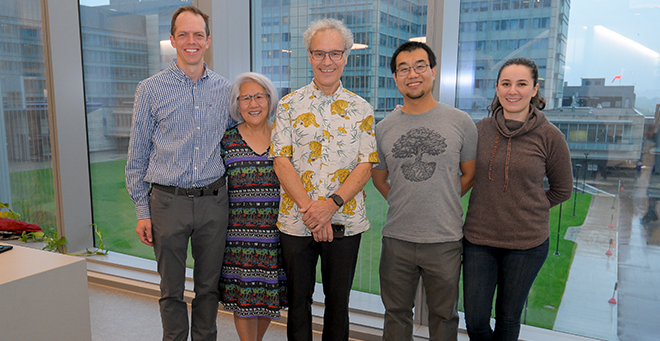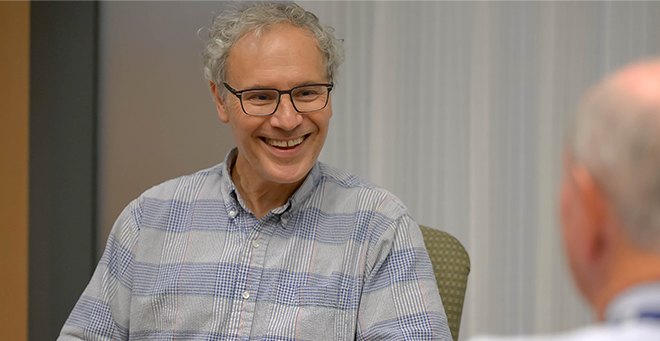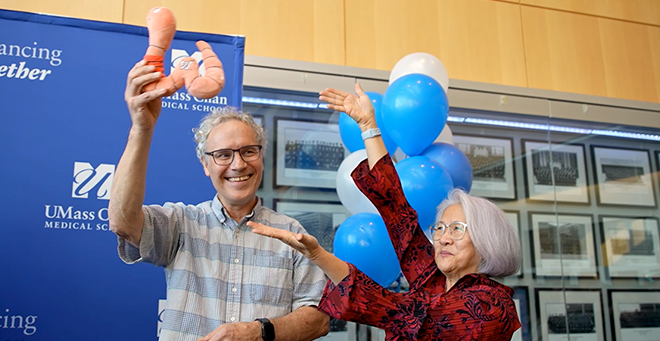
Victor R. Ambros, PhD, on stage with Gary B. Ruvkun, PhD (right), and symposium moderator Maria Brogen, PhD.
Photo: Konstantin Golubchik for Embassy of Sweden
The Nobel Prize celebration continued in our nation’s capital on Thursday, Nov. 14, for UMass Chan Medical School researcher Victor R. Ambros, PhD, co-recipient of the 2024 Nobel Prize in Physiology or Medicine.
A central figure in ribonucleic acid (RNA) biology, Dr. Ambros, the Silverman Chair in Natural Sciences and professor of molecular medicine at UMass Chan, shared the stage at the 2024 Nobel Prize Symposium at the Embassy of Sweden in Washington, D.C., with his longtime collaborator Gary B. Ruvkun, PhD, of Massachusetts General Hospital and Harvard Medical School.
On Oct. 7, Ambros and Dr. Ruvkun were awarded the Nobel Prize in Physiology or Medicine for their discovery of microRNA, the uniquely short, single-stranded RNA molecules that are now understood to be instrumental in post-transcriptional gene regulation.
The scientific symposium, hosted by the Embassy of Sweden and the National Academy of Sciences, showcased four of this year’s U.S.-based Nobel Prize laureates, giving them the opportunity to present their work and discuss the impact of their discoveries.
Maria Brogen, PhD, head of science and innovation at the Embassy of Sweden, served as the event’s moderator. Ambros and Ruvkun bantered with Brogen about the early days of their research on microRNA, the discovery of microRNA in the early 1990s and its significance.
At a glance |
|---|
“Through our collaborative work, our discovery was a small RNA regulates other genes by base pairing to the mRNAs of those other genes,” Ambros said. “You can think of mRNAs as a way evolution produces a gene that can talk to the other parts of the genome by base pairing, and it has a particularly useful application in so many different contexts, because it’s post transcriptional.”
The conversation also touched on the related concept of RNA interference (RNAi) and its discovery by 2006 Nobel laureates UMass Chan Distinguished Professor Craig C. Mello, PhD, and Andrew Z. Fire, PhD, of Stanford University. Dr. Mello completed his PhD research in Ambros’ lab at Harvard University in the 1980s.
During the Q&A portion of the symposium, a neuroscientist from the University of Michigan asked Ambros and Ruvkun what areas of science they think should be explored further that could open a new world of answers.
While Ruvkun encouraged her to explore ATP synthase, a protein that generates adenosine triphosphate in all living things, Ambros provided a broader response, saying scientists need to listen to new ideas from experts like Ruvkun and find other scientists to brainstorm and collaborate with to discover the unknown.
“We’re conditioned to think we understand most of what we need to understand to function. But in science, you constantly have to work against the instincts that assume that we know everything we need to know,” Ambros said. “I think we have to learn to have faith in the idea of mysteries.”
Urban Ahlin, Sweden’s ambassador to the United States; Marcia McNutt, PhD, president of the U.S. National Academy of Sciences; and Lars Heikensten, PhD, former CEO of the Nobel Foundation, were the keynote speakers.
Ambros and Ruvkun were joined on stage for a panel discussion with Nobel laureates John M. Jumper, PhD, director of Google DeepMind, and co-recipient of the 2024 Nobel Prize in Chemistry “for protein structure prediction”; and Simon Johnson, PhD, the Ronald A. Kurtz (1954) Professor of Entrepreneurship and head of the Global Economics and Management group at the MIT Sloan School of Management, one of three recipients of the Sveriges Riksbank Prize in Economic Sciences in Memory of Alfred Nobel 2024 “for studies of how institutions are formed and affect prosperity.”
Ambros and Ruvkun will be in Stockholm, Sweden, for Nobel Week starting Dec. 5, presenting a lecture together on Saturday, Dec. 7, at the Karolinska Institute; and culminating in the Nobel Prize award ceremony and banquet on Dec. 10. Dr. Ambros will also participate in the project “Help a scientist” on Dec. 5, in which students are given the opportunity to try out real research in collaboration with top scientists in Sweden.


